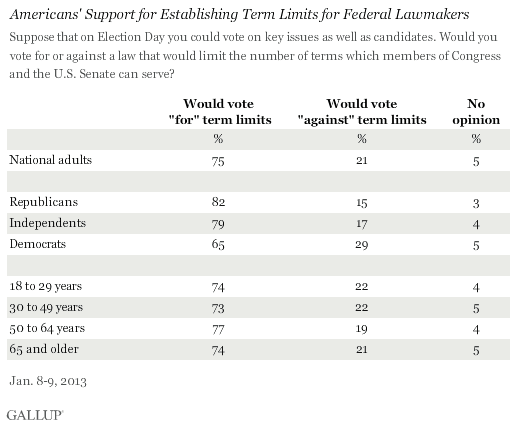It is common knowledge that each elected American president has a two-term limit, with each term consisting of four years in office. Members of Congress also serve in terms, with terms in the House of Representatives lasting two years and terms in the Senate lasting six years. However, members of Congress are not constrained to term limits and are able to serve for as many terms as they would like, given that they are reelected. Opinions among Americans on whether or not term-limits should be imposed on Congress are seemingly cut and dry. In a 2013 Gallup poll, most Democrats, Republicans, and Independents in the poll’s sample size said that they would vote in favor of Congressional term-limits if given the opportunity (Saad).
Despite political affiliation, a majority of Americans polled stated they would vote for the institution of term-limits (Saad).
In this piece, I will briefly look at the history of the American federal term-limit as well as analyze the stances of those who are for Congressional term-limits and those who oppose it.
The most famous limit placed on an American elected federal official is probably the two-term limit placed upon the president, which is enforced by the 22nd Amendment. This Amendment was added to the Constitution in 1951, in response to former President Franklin Delano Roosevelt’s unprecedented three-term presidency (N.C.C. Staff). Even though contesting and amending the Constitution has become a key aspect of American democracy, the support of a two-term limit remains strong to this day. Former President Donald Trump’s statements that he would “negotiate” his way to a third term in 2024 if he were to win in the 2020 election shocked the country, including Trump’s former attorney, Michael Cohen, who urged others to take these statements seriously (Solender). The modern reaction to even the notion of changing the presidential term limit demonstrates how much term-limits are valued in American democracy. More so, the fact that the presidential term-limit is set by an amendment to the Constitution indicates that setting limits on how long elected officials can stay in office is itself a principle of American democracy.
That being said, many Americans believe that Congress members should be limited in how many terms they can run. A 2018 Brookings article states that 74% of likely voters believe that there should be Congressional term-limits (Burgat). This argument is rooted in the same ideals that influenced the addition of the 22nd Amendment. Many Americans believe that a lack of term-limits is undemocratic. U.S. Term Limits, a group advocating for the institution of term-limits in all levels of government, says on the ‘About’ page of their website that setting term-limits allows for the “citizen legislator” to reduce external influence in Congress and introduce new ideas, just as the Founding Fathers had intended (“About”). This reference to the Founding Fathers’ intentions feels similar to the argument made for setting term limits for the U.S. president. As George Washington had only run for two terms and had refused to run a third upon request, he had set the precedent that his successors followed up until FDR’s presidency. The call to limit how long a politician can hold Congressional office reflects the sentiment that term-limits are one of the core restrictions that allow democracy to function.
Despite popular opinion, other Americans are less eager to place these restrictions on Congress. One argument made in opposition to the proposal of Congressional term limits is that lawmaking requires prior experience due to its complex nature and that it would be unwise to leave Americans in the hands of inexperienced lawmakers (Burgat). This makes sense as unlike with other professions, lawmaking is a career where experience can only truly be gained by performing the task in a setting where there are consequences. However, one cannot gain that experience unless they are able to work in a real-world setting where there are consequences. Another argument against imposing Congressional term-limits is that if Congress members know they can only hold their positions for a limited period of time, they might be less inclined to reject outward influences from lobbyist groups and to form important work relationships between other members of Congress, which help legislation to pass (Burgat). While arguments like these are legitimate in their concerns and logic, they can only represent hypothetical situations.
Even though there is strong demand for term-limits to be placed on members of Congress, senators and representatives remain able to serve unlimited terms. While both sides maintain legitimate arguments and sentiments, neither can accurately determine what a future where term-limits are placed on Congress would look like. What both sides can do is acknowledge the ever-changing needs of America as a democratic nation and use their best judgments to decide what is best for the American people.
Sources:
“About.” U.S. Term Limits, 30 Apr. 2018, www.termlimits.com/about/.
Burgat, Casey. “Five Reasons to Oppose Congressional Term Limits.” Brookings, Brookings, 18 Jan. 2018, www.brookings.edu/blog/fixgov/2018/01/18/five-reasons-to-oppose-congressional-term-limits/.
N.C.C. Staff. “FDR’s Third-Term Election and the 22nd Amendment.” National Constitution Center – Constitutioncenter.org, constitutioncenter.org/blog/fdrs-third-term-decision-and-the-22nd-amendment.
Saad, Lydia. “Americans Call for Term Limits, End to Electoral College.” Gallup.com, Gallup, 14 Jan. 2021, news.gallup.com/poll/159881/americans-call-term-limits-end-electoral-college.aspx.
Solender, Andrew. “Trump Says He Will ‘Negotiate’ Third Term Because He’s ‘Entitled’ To It.” Forbes, Forbes Magazine, 13 Sept. 2020, www.forbes.com/sites/andrewsolender/2020/09/13/trump-says-he-will-negotiate-third-term-because-hes-entitled-to-it/?sh=2414c95a287c.

